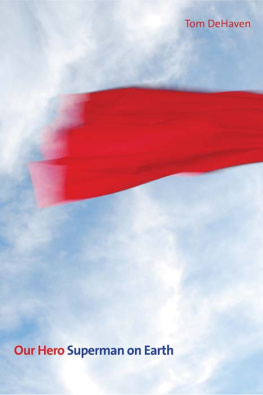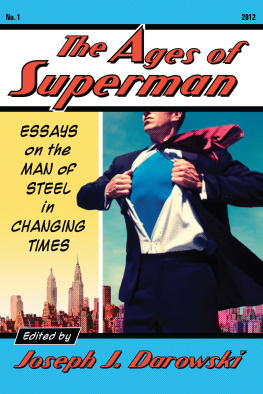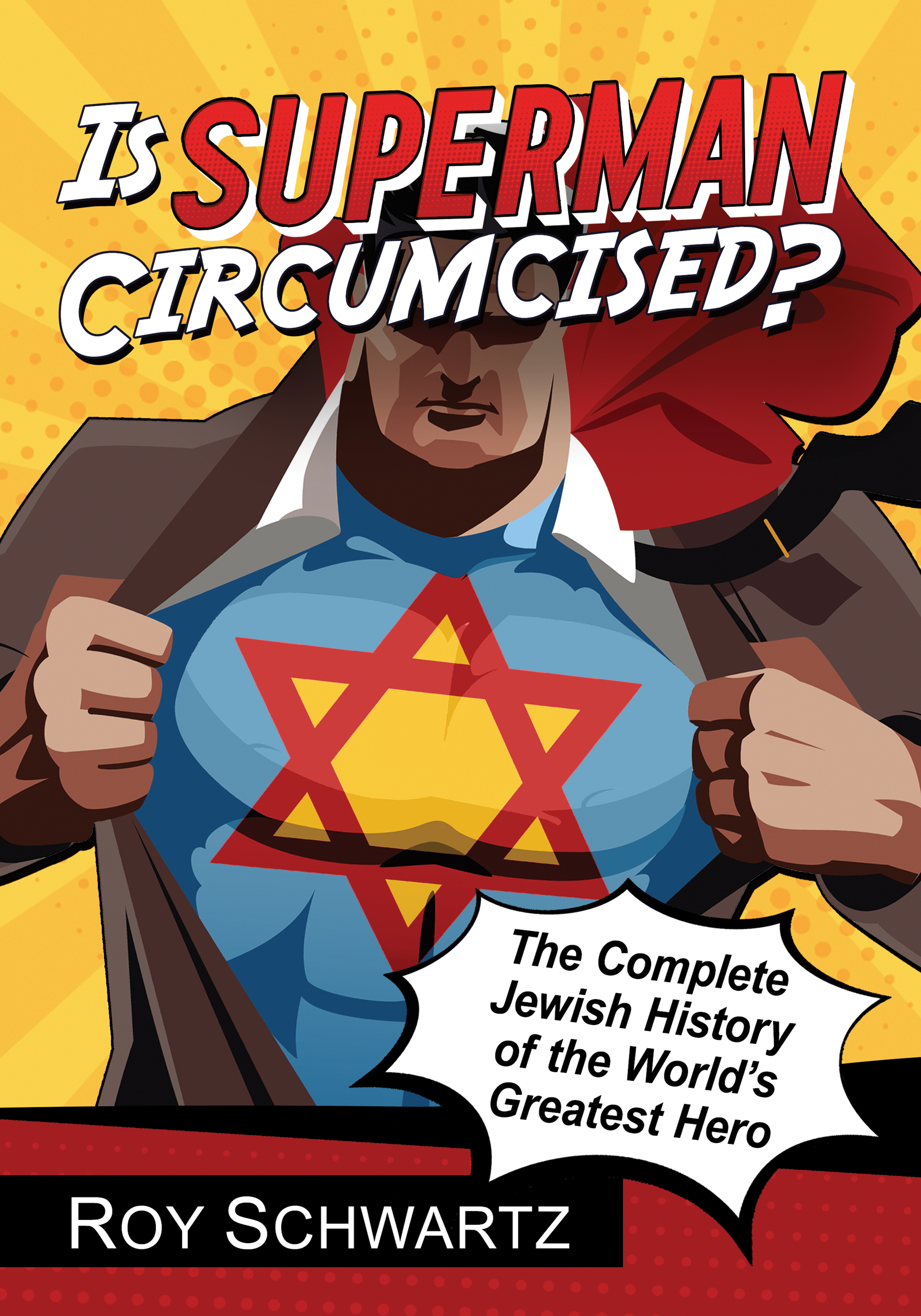Is Superman Circumcised?
The Complete Jewish History of the Worlds Greatest Hero
Roy Schwartz

McFarland & Company, Inc., Publishers
Jefferson, North Carolina
Library of Congress Cataloguing-in-Publication Data
Names: Schwartz, Roy, 1980 author.
Title: Is Superman circumcised? : the complete Jewish history of the
world's greatest hero / Roy Schwartz.
Description: Jefferson, North Carolina : McFarland & Company, Inc.,
Publishers, 2021 | Includes bibliographical references and index.
Identifiers: LCCN 2021018193 | ISBN 9781476662909 (paperback : acid free paper)
ISBN 9781476644417 (ebook)
Subjects: LCSH: Superman (Fictitious character) | Jews in literature. |
Comic books, strips, etc.United States. | Literature and
societyUnited States. | BISAC: LITERARY CRITICISM / Comics & Graphic
Novels | SOCIAL SCIENCE / Jewish Studies
Classification: LCC PN6728.S9 S45 2019 | DDC 741.5/973dc23
LC record available at https://lccn.loc.gov/2021018193
British Library cataloguing data are available
ISBN (print) 978-1-4766-6290-9
ISBN (ebook) 978-1-4766-4441-7
2021 Roy Schwartz. All rights reserved
No part of this book may be reproduced or transmitted in any form or by any means, electronic or mechanical, including photocopying or recording, or by any information storage and retrieval system, without permission in writing from the publisher.
Front cover image 2021 Shutterstock
Printed in the United States of America
McFarland & Company, Inc., Publishers
Box 611, Jefferson, North Carolina 28640
www.mcfarlandpub.com
To Kim,
As a kid Id ask myself what would Superman do?
As an adult I ask myself what would Kim do?
Youre my hero.
Table of Contents
Acknowledgments
First and foremost, my gratitude and love to my family; my wise and supportive wife Kim, without whom this book would have been a lot less coherent, and my son Ethan and daughter Iris, without whom it would have been finished a lot sooner.
My thanks to Rabbi Yoni Greenwald, a gentleman and a scholar, who helped ensure the book is accurate not just historically and academically but also theologically.
Many thanks to the New York Public Library and the writer-in-residence program, particularly Research Study Liaison Melanie Locay and Research Coordinator Rebecca Federman. Special thanks to Eleanor Yadin from the NYPL Dorot Jewish Division, who spent hours helping me track down elusive sources. And to Karen Green, Curator for Comics and Cartoons for the Columbia University Libraries, for guiding me to rare treasures.
My heartfelt appreciation to Christopher Cappelluti and Tim Duffy, who read drafts of this book with care and intelligence and helped me alchemize manure into potpourri, and to my editor Charlie Perdue.
Thank you also to David Giovanella and Suzanne Collado from the NYU Graduate School of Arts and Science, who helped me realize that if you dont make it entertaining, it doesnt really matter what it is that youre saying.
Id like to thank Chuck Rozanski from Mile High Comics, a real-life hero; Jerry Siegel and Joe Shuster, who refused to give up on their dream and changed the world; and all the writers, artists and editors that followed whose work has given me joy and inspiration. My sincerest apologies for any names or contributions left out from this book.
Finally, my thank-you to Richard Donner, Tom Mankiewicz and Christopher Reeve, for igniting my love of Superman, providing me with a lifelong role model and making me comfortable saying swell.
Preface
In a manner, I started writing this book when I was in grade school. I spent the formative years of my education filling out school notebooks in nearly every class with stories and comics and what I would later come to realize were essays. Theyd feature my favorite fictional characterstypically superheroes, usually Superman or Captain Americafighting the good fight against neer-do-wells like aliens, Nazis, terrorists and, when theyd reach the Boss Level, some variation of my ogreish homeroom teacher, Mrs. Yaakobi.
But I was interested in more than just the action and spectacle of it. My heroes speech balloons and my narrator captions were often large, taking up half the page, filled with deliberations on all kinds of things. For example, neither Superman nor Cap cared much for Rambo and Robocops eagerness to kill their enemies (it was the 80s, so childrens cartoons and toys were naturally based on R-rated movies), and whenever theyd team up to battle villains theyd also debate the use of violence, sanctity of life, and subjectivity of good and evil. As far as I remember no consensus was ever reached, though they all made some good points. Of course, to my teachers all this was just silly doodling I was wasting my time on when I should been paying attention. But I knew better.
I started reading and collecting comic books around the age of nine. I knew of them earlier, mainly through the superhero genre I loved so much on TV and in movies, but as an Israeli, born and raised in Tel Aviv, my English wasnt good enough until then to read them (comics are actually how I learned English, which is why Im comfortable using words like swell). As I delved deeper into comics over the course of my tweens and teens I found that, contrary to popular misconception, they were far from fatuous. The cartoons based on them may have been aimed at young children, and campy movie maladaptations didnt help, but the comics themselves were often sophisticated, pithy, avant-garde and sometimes filled with gravitas. Like the rest of my generation I was an avid consumer of all things pop culture, but my parents also instilled in me a love of fine arts and literature. In comics I found the perfect mix of both.
My interests hadnt changed much by the time I moved to New York to attend college. I spent most of my time as an English major trying to convince my professors that Uncanny X-Men had no less depth and was worthy of the same critical examination as Pride and Prejudice . My freshman essay was titled Worlds Finest: Superman and Batman as Didactic Utopian and Dystopian Figures. My sophomore essay was Absolute Power: Ethics and Geopolitics in the Squadron Supreme Graphic Novel. In junior year I wrote Starship Storm Troopers: Themes of Propaganda and Indoctrination in Paul Verhoevens Starship Troopers . And my senior paper was Identity Crisis: Superman as a Christ Figure. It was this last paper in particular that helped me make a case for academic inquiry into sequential art and that started the line of thinking which culminated in this book.
From grade school to grad school, whatever else held my interest, I kept reading and writing about comics. But while bachelor studies at the freethinking New School University might have accommodated my flights of fancy, the level of academic rigor expected at an NYU masters program was a different story. I had to demonstrate, convincingly, scholarly merit in the examination of the works of Siegel and Shuster, Kane and Finger, Eisner, Lee, Kirby and others.
Superman, as the paradigm for all superheroes, was the logical place to start. I also felt a special kinship with the character. I too was an immigrant, and shared his alienation, loneliness and sense of mission. As luck would have it, around then books about comic books started becoming popular, including several discussing the Jewish background of early creators. It then struck me, like a lightning bolt striking a forensic scientistSuperman isnt a Christ figure at all. Hes Jewish!







